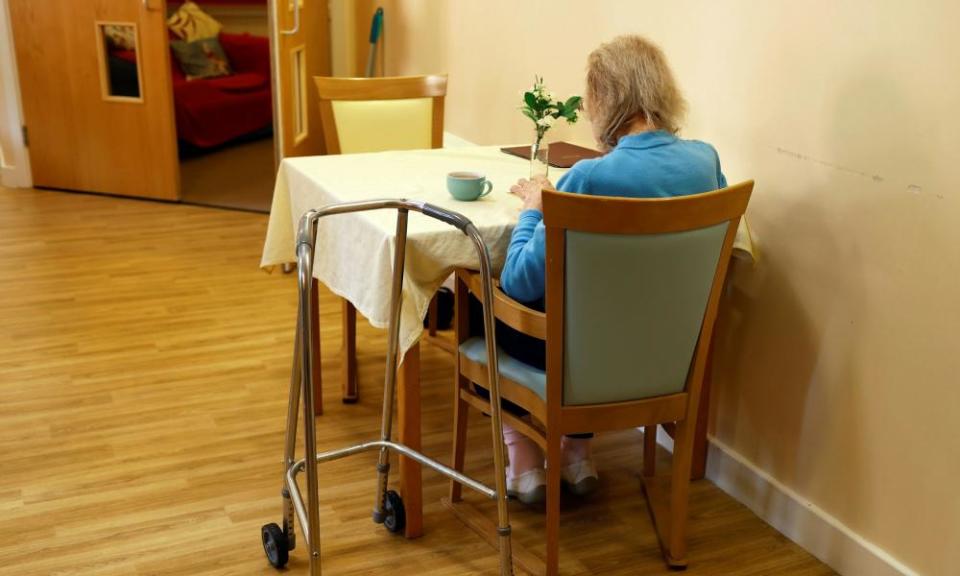Brexit: UK's new fast-track immigration system to exclude care workers

Care home staff have been excluded from a post-Brexit fast-track visa system for health workers, in a move that critics say could prove “an unmitigated disaster” and may increase the risk of spreading coronavirus.
Confirming there would be no special treatment for carers coming from the EU or the rest of the world, the government said it hoped Britons would fill a shortfall of around 120,000 workers, equating to 10% of all posts. Currently 17% of care jobs are filled by foreign citizens.
Prof Martin Green, the chief executive of Care England, which represents the largest private providers, said the decicison, amid a pandemic in which 20,000 people have died in UK care homes, “has the potential to destabilise the sector even further with potentially disastrous consequences”.
The National Care Forum, which represents voluntary providers, said it could increase the use of agency staff, which as been shown to increase the risk of Covid-19 transmission.
Details of the immigration system, which comes into force in the new year, were outlined in a 130-page Home Office paper. At a time of widespread appreciation for health and care staff during the pandemic, the government has offered fast-track entry under a “health and care visa”, with reduced application fees and dedicated support to assist those applying and their families.
But despite the name, the list of professions that can use the visa, set out in an appendix of the document, does not cover care staff.
A Downing Street spokesman said: “We want employers to invest more in training and development for care workers in this country. On care workers specifically, our independent migration advisers have said that immigration is not the sole answer here, which is why we have provided councils with an additional £1.5bn of funding for social care in 2021-22, as well as launching a new recruitment campaign.”
Vic Rayner, the executive director of the National Care Forum, said that in London, where around 38% of care workers are non-British, the policy could be “an unmitigated disaster”.
“We have 122,000 vacancies, growing demand for our services, and then the tap is turned off like this,” she said. “It is not good news at all. What you need for good care is a stable, skilled and plentiful workforce. And in the context of Covid-19, where you are trying to minimise movement of staff, any shortages might increase movement of staff and use of agency staff, which we are trying to avoid.”
Robin Hall, the secretary of Hampshire Care Association, said a shallower pool from which to recruit could drive up wages, which without greater public funding would mean fewer staff employed per resident.
“That will damage the quality of care we can deliver,” she said. “You also may have to get less choosy about who you employ, and that’s a dreadful thought. A lot of our EU staff are highly skilled. They are smart, articulate and speak three or four languages. We don’t get that quality of applicants from the UK because of the status the profession has.”
During Home Office questions in the Commons, Nick Thomas-Symonds, the shadow home secretary, asked his opposite number, Priti Patel: “What does the government have against care workers?”
While a few very senior care roles in the NHS could allow arrivals to qualify for the visa, the minimum threshold is what is known as regulated qualifications framework (RFQ) level three or above, roughly equivalent to passing A-levels.
The Home Office classes most care staff as being at RFQ one, equivalent to lower-grade GCSE passes. New overseas nationals will still be able to work in care, but only if they are dependents of someone else or have another type of visa, for example a student visa.
Much of the rest of the Home Office document sets out in more detail previously announced elements of the new immigration regime, which will close UK borders to lower-paid workers or those who cannot speak English after the country leaves the EU.
Farm workers
The new system has prompted warnings about a lack of seasonal farm workers. Arrangements have been made for seasonal harvest workers, but below levels that the National Farmers’ Union has said are needed. The updated immigration document gives no new details on this, saying the sector will be reassessed at the end of this year after the end of a pilot scheme.
English language tests
The document outlines the first details of stringent English language tests that will apply to all immigrants. In future, arrivals will have to demonstrate language competency by showing they have “passed a secure English language test” or that they “meet the required level in a previous successful immigration application”.
Scientists, engineers and artists
The document gives the first details of the government’s “global talent” route, which will be led by an Office for Talent based at 10 Downing Street. The system will encourage the arrival of not just scientists and engineers but also leading workers in the humanities and arts. Would-be arrivals can be processed rapidly if their application is endorsed by bodies such as the Royal Society, the Royal Academy of Engineering or Arts Council England.
Deportation
On deportation, the paper outlines what it calls a robust and consistent approach for people from the EU and elsewhere. Currently, EU nationals are only deported if they are deemed a threat to public security. Under the new rules, as with non-EU nationals, they will be considered for deportation if they are jailed for 12 months or more, or are serious or persistent criminals with shorter jail terms.

 Yahoo News
Yahoo News 